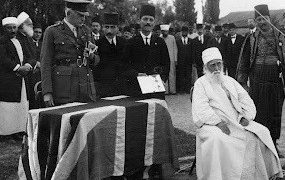The Baha’is say: “Khomeini hated the Baha’is!” of course, it is true to say: “Imam Khomeini (P.H.) hated Baha’ism.” Yes, Imam stated: “If we didn’t have any reason for then to be the spies of America, their support by Reygan would be enough for us. Baha’ism isn’t a religion. It is a party. A party which was supported by England in the past and now America is supporting them.[1]”
The historical root of Imam’s statement
During Qajar dynasty, a person called Ali Muhammad Shirazi claimed first for being the gate (the mediator between people and Imam of the Time). He had been famous for Seyyed Bab. After a while, he called himself as Imam of the Time. Later he wrote the book Bayan and claimed for abolishment of Islam. Several people were deceived and the country was afflicted by chaos. Amir the Great ordered for Seyyed Bab to be arrested, denounced and executed. After Seyyed Bab, Mirza Yahya Nouri entitled Sobhi Azal became his successor. Nevertheless, Mirza Yahya’s brother, Hussein Ali Nouri (known as Bahaullah) called Mirza Yahya as great and cunning. He introduced himself as Seyyed Bab’s real successor. During a short period of time, he claimed for prophethood and gathered some people. Eventually, Bahaullah was imprisoned; but he got free from prison, Bahaullah wrote a letter to Alexandre II (Russian Czar) and thanked him for his supports; to such an extent that he called himself as Russian Czar’s slave.[2] There are many times; according to the Baha’i documents, when Bahaullah and his relatives sought asylum to the Czar Russian embassy.[3] Then, Bahaullah was exiled to Acre (in Palestine) and surrounded by the Ottoman government. At the same time, he was in touch with both Russian and England. He died in 1892; after him, his son, Abbas Effendi (Abdul Baha) became the leader of Baha’ism movement. When the Czar government fell down in 1917, the Baha’ism heads became disappointed with the Russian communist government and turned to the British government completely.[4] It happened when England had occupied Palestine[5]. In 1918, when the British army conquered Heifa, Abdul Baha took over providing the provisions of the British army. To thank his services, the British government bestowed him the Nighthood Medal[6] and the Sir one[7]. To answer, Abdul Baha prayed for the British king (George V):
“ان سرادق العدل قد ضربت علي هذه الارض المقدسة في مشارقها و مغاربها و نشكرك و نحمدك علي حول هذه السلطنة العادلة و الدولة القاهرة الباذله في راحة الريعية و سلامته البرية اليهم ايد الامپراتور الاعظم جورج الخامس عاهل انگيزا بتوفيق اتك الرحمانية و ادام ظله الظليل علي هذه الاقليم الجليل بعونك و صونك و حمايتك انك انت المقتدر المتعال العزيز الكريم.”
O’ God, the justice royal court has been established in the land and I thank you…
O’ Lord! Assist the Great Emperor George V, the British king with your divine grace and settle his high-ranking shadow over this glorious land (Palestine).[8]”
Praising the old British Colonialism justice[9], Abdul Baha took a trip to London. He claimed for the universal peace done by England: “Thus, because the British nation is noble and the British government is a just one. We hope it to cause the peace banner to be raised all over the world and for the oneness of human world to be observed[10].” Abdul Baha and other Baha’i heads played an essential role in occupying Palestine by England. As the Ottoman government concluded that occupying Palestine by England occurred by the treachery of Baha’is and Ahmad Jamal Pasha (the commander of the sea force of the Ottoman government and the ruler of Syria and Lebanon) planned to revenge this treachery and to crucify Abdul Baha.[11]
During Pahlavi periods of time, the Baha’i movement was spying for England and Israel against Iran and Islam. As Hussein Fardoust writes in his memoirs: “The Baha’is have seen didn’t really feel they were Iranians and it was quite sensible and such people were spies intrinsically[12].” During the current periods of time, the Baha’ism movement is treacherous against Iran as the infantry of the Colonialism system. The active presence in 1388 sedition, providing and making films and photos of the country problems and sending them for the foreign media are of the samples of the issue. Also, according to security people in charge, most girls who unveiled were Baha’is. Even during the last year, the Baha’ism movement formed some mafia bands to hoard masks during Corona Virus conditions. [13]
Now, in these conditions, we are approaching the presidential election 1400 and the Baha’ism movement is trying to destroy the popularity of the system of the Islamic republic of Iran. The movement like the deviant cult of Baha’ism doesn’t basically possess any position among the Muslim people of Iran. The Iranian people hate them due to their tyrannies during Pahlavi government specially the second one and it won’t be decreased.
[۱]Sahifeh Nour, written by Imam Khomeini (P.H.), Vol. 17, p. 460.
[۲] Shoqi Effendi, Badi’a century, translated by Nasrullah Mawaddat, Bija: the National Institute of the Faith Press, 125 Badi’a, Vol. 2, p. 49, Badi’a century, part 2, p. 33., Abdul Hamid Ishraq Khawari, the 19th days, 3rd edition: 121.
[۳] Amanullah Shafa, A letter from saint Palo, p. 316.
[۴] Jawad Nawaeeyan Roudsari, the spider webs, Mashhad: Khorasan artistic and cultural institute, 1394, p. 36.
[۵] Shoqi Effendi, Badi’a century, translated by Nasrullah Mawaddat, p. 291.
[۶] Lady Blomfield George Ronald pub, 2007, pp. 201-210. The Chosen Highway.
[۷] Shoqi Effendi, Badi’a century, Vol. 1, p. 299.
[۸] Sobhi, father’s message, 1st edition, p. 137.
[۹] Abbas Effendi, Makatib, Egypt: Farajullah Zakiul Kurdi, 1921 A.D., Vol. 3, p. 347.
[۱۰] Abbas Effendi, the Sermons, Vol. 3, p. 90.
[۱۱] Shoqi Effendi, Badi’a century, Vol. 1, p. 299.
[۱۲] Hussein Fardoust, the emergence and falling of Pahlavi kingdom, Bija: Ettela’at, 170, Vol. 1, p. 282.
[۱۳] Dana correspondence, the news title: The Baha’i band if hoarding masks in several cities of the country.






